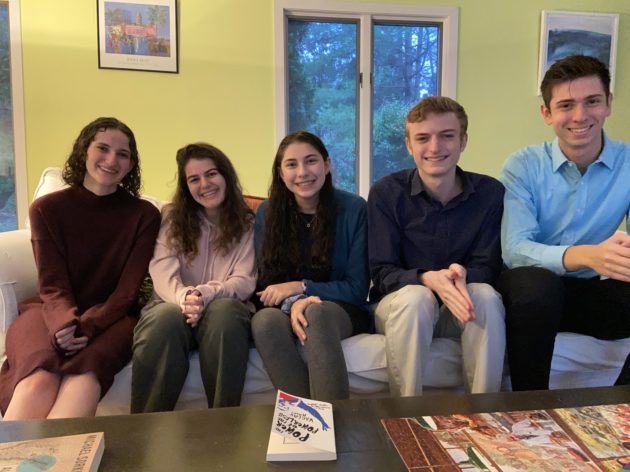The Lilith Blog 1 of 2
January 11, 2021 by Madison Hahamy
Finding My Judaism in the Middle of Nowhere

It seemed like the natural choice in 2020: when a group of friends from college offer you the opportunity to join their quarantine pod for the fall semester, in an Airbnb in the middle of a forest in the Hamptons of Long Island, NY, you say yes. When that offer comes after more than six months of no contact with anyone other than immediate family (love you all), that YES is even more emphatic.
I was so excited by the prospect of something, anything, that would allow me to be reunited with college friends and have a change of scenery that I brushed off the fact that all of them are on the Orthodox spectrum of Jewish observance—and I am very much not.
I’ve always considered myself to be a practicing Jew: I went to Hebrew School, had a bat mitzvah, know and celebrate all of the major holidays, and so forth. I attend a Conservative Synagogue when I’m at home in Chicago, and used to attend events with the affiliated youth group, USY. We don’t cook pork or shellfish in our house, but, every so often I’ll order bacon when out to breakfast and feel guilty about it. My mom and I started making challah on Fridays. We still haven’t figured out the proper amount of flour, so it’s a bit sticky, but very delicious.
When I went to college and found myself making friends with much more observant Jews, my own level of observance changed. There was a kosher dining hall that was both convenient and delicious, so I ate most of my meals there. Some of my friends were shomer Shabbat, Sabbath observers, so I spend the majority of Saturday with them, mimicking their refraining from technology. Shabbat dinners were a raucous and lovely affair, so I would go every Friday night and then stay for the zemirot (after-dinner singing) and oneg, just because. My Jewish observance felt like a sponge. I was passively absorbing whatever level was present in my surroundings: as expected, when I went home, I reverted back to the level of my parents and what I grew up with. The only change was that I did introduce some Hillel songs into our Shabbat dinner roster.
And now, here in the middle of the woods, my sponginess has led me to the other side of the spectrum. I learned milchig and fleishig and blue and red and not to mix and not to use hot water and the 18 minutes after which Shabbat really starts — a grace period with various explanations that my housemates often used to finish cooking meals for the next day, as no appliances could then be used. I take Shabbat walks, sing Havdalah, use a bencher — a small prayerbook — for after-meal grace on Shabbat, and began to absentmindedly leave my bathroom light on during Shabbat, so I don’t have to flick the button.
And I felt, weirdly, sad that I had not grown up with the traditions of this other life. One with multi-hour walks and meals on Shabbat, an incredibly appealing act of anticapitalist resistance against the workaholic culture I envelop myself in during the week. One with rigid rules and often entertaining loopholes. One with its timeless traditions and gorgeous melodies that my body sinks into as we all sing together.
I don’t imagine that I’ll keep this up when I go home. We don’t have a Kosher kitchen, and, in a vacuum, it doesn’t make me feel closer to Judaism to keep up that aspect of observance. And I like being able to turn lights on and off, to be able to cook whatever I want, to drive to different locations. But, for the most part, I’ve really appreciated the break from technology. I like singing. I like praying. I like walking.

Now that I’ve experienced a whole spectrum of Jewish observance, I’m excited to stop passively following what others do and decide for myself how I want to move forward. When I get home, when all of this year’s strife settles into a new normal, I will begin to create a Judaism that feels right for myself.
And I’ll be forever grateful for my friends — and our Airbnb in the middle of nowhere — for providing me with the opportunity to learn for myself what that might look like.
 Please wait...
Please wait...